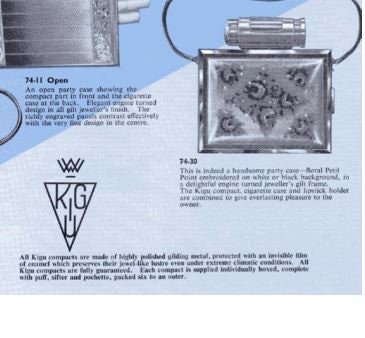Highlights










Description
Here is a simply fabulous Kigu collector's item from the early 1960s - a rectangular lacquered brass powder compact with a pretty Petite Point embroidery design of two-tone pink roses on the lid, and an engine-turned textured design on the reverse.
This has the usual inner lid released by a slide catch, which was a regular feature of the Kigu compacts. This also has its original sifter inside.
This compact measures 8cms x 6cms including the front catch. (3 1/8" x 2/8") and roughly 1.4 cm thick (1/2") and has intact hinges and clasps which are all in good working order. The clear plastic cover over the embroidery appears to be coming out of the retaining frame just at one corner, but all is OK at the moment. Take care with it...
ORIGINAL PRICE ?
So what did something like this cost you back in 1963?
My final photo is a clip from the 1963 Kigu catalogue which shows the same pretty lid design on a party case with a little description. According to the price list for the 1960 catalogue, which has the same compct with a slightly different embroidery design, the recommended retail price was around 33 shillings and 9d, (or u00a31 13s 9d). This was relatively expensive because according to my inflation calculator, this equates to around u00a345-u00a350 in equivalent spending power today. Kigu was a very high quality brand product, and almost as popular as Stratton. This was probably in production for quite a few years too as the popularity of these powder compacts was very high.
CONDITION:-
This is in pretty good condition except for the plastic cover as I mentioned. The mirror is very clear and it is all clean inside. Other than the cover issue, there's nothing wrong with this at all. The sifter is still absolutely pristine and unused. It all adds up to a simply wonderful collector's item.
KIGU
Josef Kiaschek, Master Goldsmith, created the first ever powder compact in his workshops in Budapest, Hungary. His son, Gustav subsequently founded KI-GU in Budapest and was the creator of fine hand-made compacts.
Gustav raised three sons, Charles, Paul and George. Charles settled in New York to pursue his career as a goldsmith. George moved to London where he founded KIGU of LONDON and was later joined by his brother Paul in post-war years.
Kigu's reputation for quality of design, innovation and quality remained unsurpassed during the boom years for powder compacts. Exports were made to most countries throughout the world where the Kigu brand became a household name.
Upon George's death in 1977, his son David joined the Company having just completed studies at University and took the brand through until the early 1980's, when the famous KIGU brand was acquired by A.S. Brown Mfg. who themselves had their own range of Mascot compacts. Subsequently, Laughton & Sons. acquired both the Kigu and Mascot brands to add to their own Stratton compact brand.
An original and unique collection exists to this day and may be found illustrated on this Kigu archive website, also the source of my Kigu catalogue photos here:-
http://.vintage-compacts/